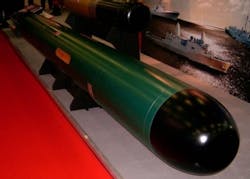Navy looks to Lockheed Martin Sippican to improve shallow-water performance of MK 48 heavyweight torpedo
The MK 48 ADCAP heavyweight torpedo is the submarine's key weapon for attacking surface ships and other submarines. The MK 48 is 19 feet long, weighs more than 3,500 pounds, and has advanced homing, wire guidance capabilities, and packs a powerful punch with its 660-pound high-explosive warhead. It is designed to kill fast, deep-diving nuclear submarines and high-performance surface ships.
While the MOD 5 and MOD 6 versions of the MK 48 ADCAP are particularly effective in deep water because of their improved guidance and low-noise propulsion, the underwater weapon until recent years had been found wanting in noisy shallow-water areas.
To fill this gap, the U.S. Navy moved forward with the MOD 7 version of the MK 48 ADCAP torpedo by adding the Common Broadband Advanced Sonar System (CBASS) to extend the heavy torpedo's sonar array into a broadband mode, as well as by upgrading its onboard signal processing make the torpedo even more effective against countermeasures and extremely quiet diesel submarines operating in shallow coastal waters and harbors.
The MK 48 ADCAP Mod 7 CBASS torpedo, operational since 2006, is optimized for deep and littoral waters, and has advanced counter-countermeasure capabilities. Its development was the result of a joint development program with the Royal Australian Navy and reached Initial Operational Capability in 2006. The CBASS replacement kit will improving CBASS performance in shallow water against the most quiet and dangerous enemy submarines.
On the current contract, Lockheed Martin Sippican will do the work in Marion, Mass., and Akron, Ohio, and should be finished by May 2014.
For more information contact Lockheed Martin Sippican online at www.sippican.com, or Naval Sea Systems Command at www.navsea.navy.mil.
